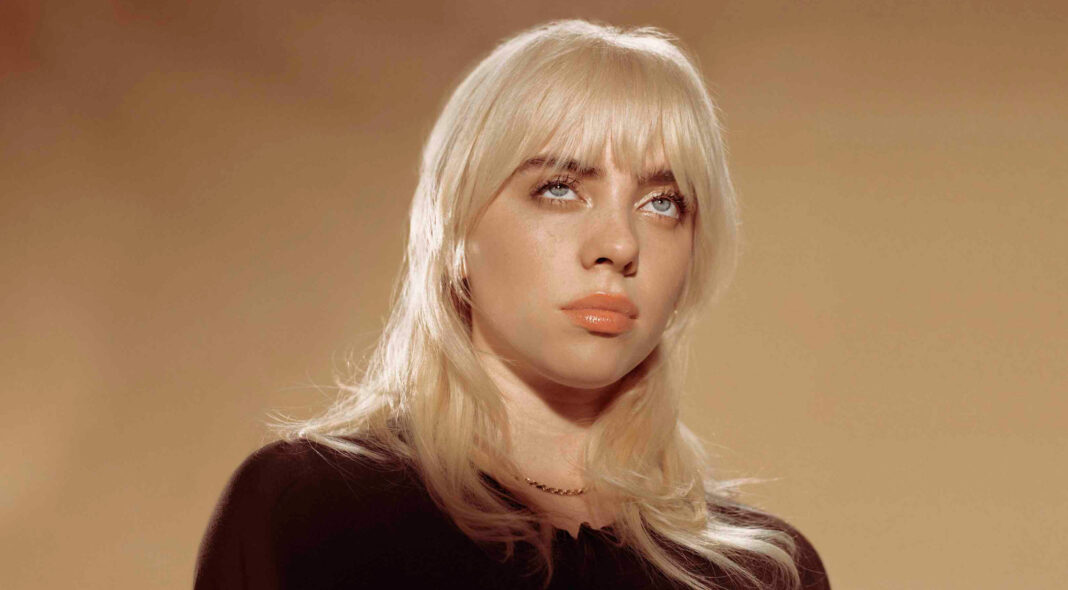Zoom out from the title of Billie Eilish’s second album ‘Happier Than Ever’ – a sarky jab at those who called her too gloomy – and it’s dark business as usual: “When I’m away from you / I’m happier than ever.” Clearly, things aren’t quite what they seem, and that’s typical of Eilish’s eerie brand of pop, but her desire to both draw attention to and distance herself from toxic situations – well, that’s the sign of an evolving, self-aware star.
In 2019, Eilish casually broke apart the music world with her debut album ‘When We All Fall Asleep, Where Do We Go?’, a multi-platinum Grammy magnet that redefined pop for a new, self-aware, hyper-online generation. She became a household name. You couldn’t miss her baggy-clothed, neon-goth aesthetic. At seventeen, she was the youngest artist since Lorde to have a Billboard number one hit, and the first since 1981 to sweep all four major Grammys. She’s earned a Guinness World Record and been the topic of an acclaimed documentary. She owns the word “duh”.
Her melancholy mid-tempo sound, produced by Finneas – murmurs sharpened with industrial beats and plenty of amplified bass – sent artists old and new scurrying to their bedrooms with GarageBand. The siblings harnessed digital vocal play for an experience that almost transcended listening. Eilish’s close-to-mic whispers and fondness for strange samples (popping Invisalign, dentist drills, street crossings) have one foot in the world of ASMR, while her lyrics dealt with issues faced by modern teens – from mental health to heartbreak – via shattering punchlines.
‘Happier Than Ever’ may be the dreaded second album, but it was actually born under calm, less pressurised conditions. Recorded in the spare time afforded during 2020, and once again produced by Finneas, Eilish was not hounded by the usual deadlines and label interference. The result: an album that exists entirely on its own terms, apathetic about following mainstream trends or generating big hits.
Eilish’s blonde, corset-clad new look, unveiled via a Vogue cover interview accompanied by lead single, ‘Your Power’, deliberately flies in the face of her previous aesthetic: she turned to jazz singers (Julie London, Peggy Lee) and fifties pin-ups like Betty Brosmer for inspiration. But her new music contains none of the swooning teen innocence of fifties pop. “There’s so much anger in those songs – anger and disappointment and frustration,” she said in the interview.
In fact, the songs are darker than ever. ‘Your Power’ floats in on soft acoustic strums, but behind Eilish’s sweet falsetto lies cold, careworn anger at men who take advantage of their power. “I thought that I was special / You made me feel / Like it was my fault, you were the devil,” she avows. She understands the power of fame, but makes no excuse for it: the lyrics are unforgiving and uncomfortable. Sonically, there’s little to write home about, but Eilish calls ‘Your Power’ an “open letter” rather than a song – and her news is important.
It’s ballsy to kick off with a guitar ballad when you’re known for distorted beats – let alone one so stark and vulnerable. Similarly scant opening track ‘Getting Older’, her voice accompanied by nothing but petite, jaded synth chords, depicts a young woman navigating an industry that still hasn’t shaken off the misogyny it was born into. She devastatingly admits, “Things I used to enjoy keep me employed” (she’s still only nineteen), before concluding, “I’ve had some trauma, did things I didn’t wanna / Was too afraid to tell ya, but now I think it’s time.” Spoken word centrepiece ‘Not My Responsibility’, originally part of a 2020 tour visual, reveals the double standards women are subject to, already prodded at by the album’s muted vintage glam cover: “If I wear what is comfortable, I am not a woman / If I shed the layers, I’m a slut.”
‘Happier Than Ever’ transforms the cartoon creepiness of Eilish’s debut into darker disquiet: the new songs navigate shifting sands and throw unnerving curveballs. With its pure Hitchcock chill and chorus that creeps up on you, ‘NDA’ sits closest to her previous music, as she contemplates the cost of fame. And for every frantic, jittery ‘Oxytocin’ or ‘I Didn’t Change My Number’, there’s an unexpected hymn (‘GOLDWING’), a love song (‘Halley’s Comet’), or ‘Billie Bossa Nova’, which does exactly what it says on the tin. These are Lynchian levels of unsettling: dreamy yet cold, like a classic movie playing on a shipwreck deep underwater.
Beige trip-hop number ‘Lost Cause’ sounds like a watered-down coffee-shop playlist offering, with a spiteful central line – “you got no job” – that’s a little thoughtless given the current economic climate. And the ballad-heavy track-list might tip the entire album into similarly beige territory, but it’s rescued by tense, canny sequencing (‘Oxytocin’ into ‘GOLDWING’, ‘Everybody Dies’ into ‘Your Power’) that affirms the album’s strength as a complete body of work.
After simmering for fourteen tracks, Eilish eventually loses her rag on penultimate song ‘Happier Than Ever’, her warped Peggy Lee turn erupting into astonishing, electric guitar fury. The delayed gratification pays off. It’s a standout track on an album that expands rather than stagnates Eilish’s sound, threading together disparate genres with her distinctive vocal delivery. She’s crisper, fuelled by angry, visceral emotion. She swerves mainstream demands, exposes misogynistic horror, and somehow betters an extremely successful debut. Happier than ever? No shit.
READ MORE: Billie Eilish’s saddest songs







